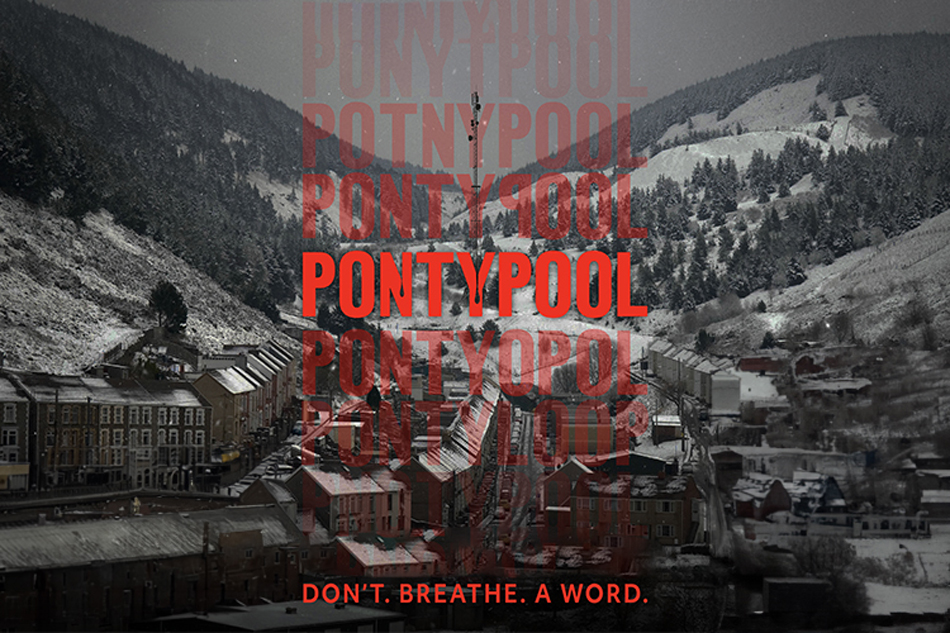
Pontypool
Hall Green Little Theatre
****
Words. They define us, they can knock us
down or lift us up, express love or hate, warn of danger or delight but
at the end of the day, as the old saying has it, sticks and stones may
break my bones, but words will never hurt me . . .
That homily of reassurance was called into
question by Canadian author Tony Burgess' 1998 novel, Pontypool Changes
Everything which changed to just Pontypool for the 2008 Canadian horror
film, which, like the book, was set, appropriately, in Pontypool,
Ontario.
It then morphed into a radio play and from there
Welsh writer Hefin Robinson adapted it for the stage and moved it 3,500
miles or so to Monmouthshire and the Welsh town the Canadian setting was
named after, with its debut performance over Halloween last year.
A year on and the eve of All Hallow's Day fast
approaching again, director Katie Hughes has nudged the play up the M5
to the edge of the Midlands to give us locations, and police forces we
can recognise making the words - words again – more relevant.
We open in the run-down basement studio of local
station Beacon Radio, CLSY 660 with their relatively new shock jock
Grant Mazzy, doing his best to build an audience with a theory that
being controversial and challenging, some might even say more annoying,
his listeners is the way to go. He is one of the, should we say, more
enthusiastic radio presenters who works on the basis of why use one word
when a dozen or more, delivered scattergun style, will do. It is a
wonderful performance from Shaun Dodd.
With Grant chucking his constant stream of
observations and buzz words – words again – into the ether, his
hard-pressed producer Sydney Briar tries to keep him vaguely on track
and tries manfully to persuade him to switch to weather and traffic
reports and to read out school closures because of heavy snow – the
bread and butter of local radio . . .
Alice Abrahall provides a sensible, reasoned foil
to Grant's flights of fancy and excesses, a safe pair of hands and even
safer is Jasmine Taha as the technical assistant Laurel Ann Drumoond,
ex-forces with a tour of Afghanistan to her name.

So, we have Grant waffling on about . . . . who
knows what . . . . presumably someone out there was listening. and we
have had the weather, -5degC folks - and the traffic, building up
northbound on the M5, and . . . . well there was some dispute about
fishing at Earlswood Lakes but that came to nothing and then Ken in the
Sunshine Chopper, the station's eye in the sky, reports a gathering
crowd outside the surgery of Dr Flora Mendez.
We never see Ken, just hear him, voiced by David
Hirst. He is our eyes on the world outside the studio, the real world .
. . or is it?
Now when the gathering starts to turn . . . .
well fatalities are not really what you expect in small town
demonstrations, Ken's Sunshine Chopper rapidly loses height and crashes
down to earth, all helping to expose the myths words can create, the
pictures they can build up and plant in our minds.
We know about auto suggestion, the use of
subliminal messaging, not exactly illegal but frowned upon in
advertising and political broadcasts, but what if the words were not
carrying a simple message . . . . but were the message, and not just to
influence, to suggest, but to control, to dictate . . . the simple act
of communication being corrupted into a cataclysmic nightmare?
Come the second act and Dr Mendez has escaped the
mob outside her surgery and is in the studio trying to make sense of the
mayhem unfolding outside while in the control room Laurel has heard, or
said, or written or screamed her mind away. Whatever the wrong words can
do, whatever they trigger or blight she is now a violent, lost victim.
Joanne Newton is a nervous Dr Mendez, an expert
in . . . we never do find out her speciality, but at least she seems to
speak with some authority in the mass hysteria, mob violence, killing
and apocalyptic scenes outside. She paces around, trying to explain and
understand what is going on, studying the rapidly changing and
deteriorating Laurel, trapped behind glass in the locked control room.
Ken, our man on the ground, which is all he ever
really was as Beacon tried desperately to sound more than it ever was,
is becoming less reliable as a reporter at large while Jasmine, is
becoming more and more possessed by, well, whatever word fits . . . it
is a stunning performance not for the squeamish.
The tension builds up slowly and as we never
leave the studio all the information comes by phone ins and people
outside. Nothing is ever corroborated; we rely entirely on voices from
outside to tell us what is going on.
Reality is what the voices tell us, and do we
trust them or believe them . . . who knows?
The set is simple, two desks, one for presenter,
one for production, either side of the glass dividing wall and a special
mention for Emily Beaton with make up that would not look out of place
in a mediaeval torture chamber.
There are some gaping holes in the plot, but the
general message is that words are not necessarily what they seem and
what we are told might not necessarily be the truth . . . as a cursory
glance at Twitter or X will prove. The words will be dangerous to
01-11-25.
Roger Clarke
29-10-25
|

